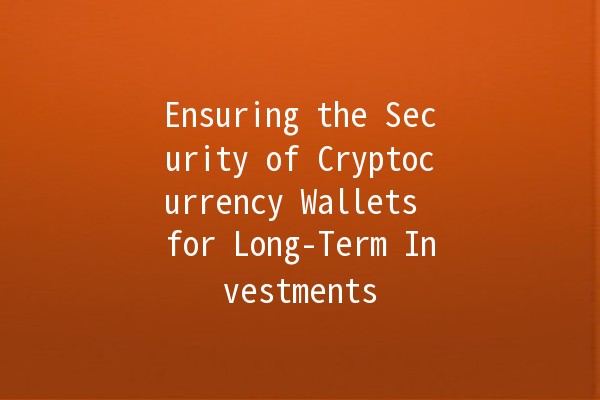




In the evolving landscape of digital finance, cryptocurrency investment has become increasingly popular. With its volatile nature, many investors are turning to longterm strategies to mitigate risk and maximize returns. However, to ensure the success of these strategies, securing cryptocurrency wallets is paramount. This article explores the various aspects of cryptocurrency wallet security and offers practical tips for longterm investors.

Cryptocurrency wallets are digital tools that allow users to store, manage, and send cryptocurrencies. They come in various forms, predominantly categorized as:
Hot Wallets: These are online wallets accessible via the internet. While convenient for quick transactions, they are more vulnerable to hacking.
Cold Wallets: These are offline wallets, like hardware and paper wallets, providing enhanced security against online threats. They are ideal for longterm investments as they keep your assets completely offline.
As cryptocurrencies grow in popularity, they become a prime target for cybercriminals. Ensuring the security of your wallet is essential to safeguarding your digital assets. Here's why:
The increasing value of bitcoin and other cryptocurrencies has led to a surge in thefts and hacking incidents.
Unlike traditional banks, cryptocurrency transactions are irreversible. Once funds are stolen, the chances of recovery are slim to none.
A secure wallet enhances investor confidence, promoting a healthier trading environment.
Here are five effective strategies to improve the security of cryptocurrency wallets for longterm investors:
Explanation: Cold wallets, such as hardware wallets or paper wallets, store your cryptocurrency offline, away from potential hackers.
Example: If you are holding Ethereum for several years, transfer it from a hot wallet to a cold wallet, like a Ledger Nano S. This way, even if your hot wallet is compromised, your Ethereum remains secure in the cold wallet.
Explanation: Implementing 2FA adds an additional layer of security by requiring two forms of verification before allowing access to your wallet.
Example: Use Google Authenticator or Authy to set up 2FA on your hot wallets. Every time you log in, you will need to enter a verification code sent to your device, making unauthorized access more challenging.
Explanation: Keeping wallet software and associated applications up to date ensures that you benefit from the latest security patches and improvements.
Example: If you use a software wallet like Exodus, regularly check for updates and install them promptly to prevent vulnerabilities that could be exploited by attackers.
Explanation: Setting a strong, unique password for each wallet significantly reduces the risk of unauthorized access.
Example: Instead of using easytoguess passwords like “123456” or “password”, opt for a mix of upper and lower case letters, numbers, and symbols, such as “Gh7!x90%@LmZ”. Utilize a password manager to store and generate complex passwords for added convenience.
Explanation: Phishing attacks involve tricking users into revealing sensitive information. Awareness can prevent these scams.
Example: Always doublecheck URLs before entering sensitive information. If you receive an email claiming to be from your wallet provider, verify its authenticity by checking the sender's address and looking for signs of phishing, such as poor grammar or unfamiliar links.
Investors should also understand the vulnerabilities associated with different wallet types:
Online Threats: Being connected to the internet makes hot wallets susceptible to hacking.
Malware Attacks: Keyloggers can capture your password and private keys.
Physical Theft: If someone gains access to your cold wallet (e.g., USB drives), they can steal your cryptocurrencies.
Loss of Access: Losing a hardware wallet or forgetting a recovery phrase can result in the permanent loss of funds.
To navigate the exciting world of cryptocurrency investment successfully, securing your digital assets is paramount. Implementing the strategies discussed will significantly enhance your wallet's security and provide peace of mind as you pursue longterm investment strategies.
The safest type of cryptocurrency wallet is a cold wallet, such as a hardware wallet or a paper wallet. These wallets store your cryptocurrencies offline, making them less vulnerable to hacking and theft.
It's advisable to change your wallet passwords every three to six months, especially if you suspect any unauthorized access. Additionally, changing your password after significant updates or security breaches is crucial.
For longterm investors holding substantial amounts of cryptocurrency, hardware wallets are highly recommended due to their highsecurity measures. They provide offline storage solutions that protect against online threats.
If you lose access to your hardware wallet, recovery depends on having a backup of the recovery phrase (seed phrase). It's important to store this phrase securely and in multiple locations to avoid losing access to your funds.
Yes, some wallets support multiple cryptocurrencies, making management easier. However, it's important to choose wallets specifically designed for multicurrency support to ensure compatibility and security.
Look for signs such as suspicious URLs, poor grammar, and unexpected requests for sensitive information. Legitimate companies will never ask for your password or private keys via email. Always verify the authenticity of any communication before acting.
These strategies are essential for any investor looking to secure their digital assets effectively. Implementing these practices can drastically mitigate risks and ensure the safety of your longterm investments in cryptocurrency.